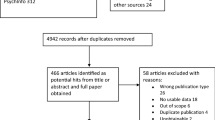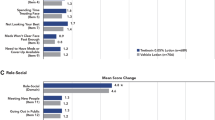Abstract
The Dermatology-specific Quality of Life (DSQL) instrument is a new tool which has been developed to address the effects of skin disease and its treatment on physical and social functioning and self- perceptions. Previous reports have demonstrated its cross-sectional validity. The current study examines the DSQL's responsiveness to 12 weeks of acne treatment in a placebo-controlled randomized clinical trial. The DSQL change scores were moderately correlated (r=0.18 to 0.37) with treatment efficacy parameters including: dermatologist's rating of improvement of acne and a skin irritation score, and highly correlated with patient's global rating of acne severity. Within treatment groups, the DSQL discriminated clinically meaningful changes associated with small and moderate effect sizes. The DSQL total score showed statistically significant differences on nearly all comparisons with placebo. The DSQL dimension scores were sensitive to the most effective therapy compared to placebo. Responsiveness benchmarks are provided for small and moderate-sized treatment effects. As a comprehensive instrument, the DSQL is a practical and psychometrically sound tool for use in clinical trials in dermatology.
Similar content being viewed by others
References
Pochi PE. The pathogenesis and treatment of acne. Annu Rev Med 1990; 41: 187-198.
Motley RJ, Finlay AY. Practical use of a disability index in the routine management of acne. Clin Exp Dermat 1992; 17: 1-3.
Shuster S, Fisher GH, Harris E, Binnell D. The effect of skin disease on self image. Br J Dermatol 1978; 99: 18-9.
Medansky RS, Handler RM, Medansky DL. Self-evaluation of acne and emotion: a pilot study. Psychosomatics 1981; 22: 379-83.
Koo JY, Smith LL. Psychologic aspects of acne. Pediatric Dermatol 1985; 8: 185-188.
Finlay AY, Khan GK. The Dermatology Life Quality Index: A simple practical measure for routine clinical use. Clin Exp Dermatol. 1994, 19: 210-216.
Wu SF, Kinder BN, Trunnel TN, et al. Role of anxiety and anger in some patients: a relationship with the severity of the disorder 1988.
Lowe JG. The stigma of acne. Br J Hospital Med 1993; 49: 809-812.
Motley RJ, Finlay AY. How much disability is caused by acne? Clini Exp Dermatol 1989; 14: 194-198.
Krowchuk DP, Stancin T, Keskinen R, et al. The psychosocial effects of acne on adolescents. Pediatr Dermatol 1990; 8: 332-338.
Fried RG, Shalita AR. The reciprocal interaction between acne and the psyche. Focus Cutis Psyche 1992; November; 23-33.
Poorman SG. Webb CA. Sexuality and self-concept: issues in skin disease. Dermatol Nursing 1992; 4: 279-286.
Jowett S, Ryan T. Skin disease and handicap: an analysis of the impact of skin conditions. Soc Sci Med 1985; 20: 425-429.
Gupta MA, Gupta AK, Schork NJ et al. Psychiatric aspects of the treatment of mild to moderate facial acne. Int J Dermatol 1990; 29: 719-721.
McKenna KE, Stern RS. The outcomes movement and new measures of the severity of psoriasis. J Am Acad Dermatol 1996; 34(3): 534-538.
Anderson, R, Rajagopalan, R. Development and validation of a dermatology specific quality of life instrument. J Am Acad Dermatol, July, 1997; 35.
Rajagopalan R Anderson RT. A profile of patients with contact dermatitis with suspected allergy (history, physical characteristics and quality of life). Am J Contact Dermat, 1997.
Lennox R. Structural validation of the DSQL: confirmation of the factor structure and justification of the scoring algorithm. In: Rajagopalan R, Sherertz E Anderson RT, eds. Care Management of Skin Diseases: Life Quality and Economic Impact. New York, NY: Marcel Dekker Inc., 1997.
Hays RD, Anderson RT, Revicki D. Psychometric considerations in evaluating health-related quality of life measures. Qual Life Res 1993; 2: 441-450.
Cohen J. Statistical Power Analysis for the Behavioral Sciences. New York: Academic Press, 1977: 8.
Kazis, L.E. Anderson JJ, Meenan, RF. Effect sizes for interpreting changes in health status. Med Care, 1989; 27: S178-S189.
Guyatt G, Walter S, Norman G. Measuring change over time: assessing the usefulness of evaluative instruments. J Chronic Dis, 1987; 40, 171-178.
Hays R, Hadorn D. Responsiveness to change: an aspect of validity, not a separate dimension. Qual Life Res, 1992; 1: 73-75.
Chambers LW, Haight M, Norman G, MacDonald L. Sensitivity to change and the effect of model of administration on health status measurement. Med Care, 1987; 25: 470-480.
Ware JE, Snow KK, Kosinski M, Landek B. SF-36 Health Survey: Manual and Interpretation Guide. Boston, MA: Nimrod Press, 1993.
Cronbach LJ. Coefficient alpha and the internal structure of tests. Psychometrika 1951; 16: 297-334.
Nunnally J. Psychometric Theory 2nd edn. New York: McGraw-Hill, 1978.
Crowne DP, Marlowe D. A New scale of social desirability independent of Psychopathology. J Consult Psy 1960; 4: 349-354.
Mallon E, Newton JN, Klassen A, Ryan TJ, Finlay AY. Standard patient assessed quality of life instruments can be used to measure benefits of acne treatment. Br J Dermatol, 1995; 133: 575-578.
Author information
Authors and Affiliations
Rights and permissions
About this article
Cite this article
Anderson, R., Rajagopalan, R. Responsiveness of the Dermatology-specific Quality of Life (DSQL) instrument to treatment for acne vulgaris in a placebo-controlled clinical trial. Qual Life Res 7, 723–734 (1998). https://doi.org/10.1023/A:1008832917452
Issue Date:
DOI: https://doi.org/10.1023/A:1008832917452




